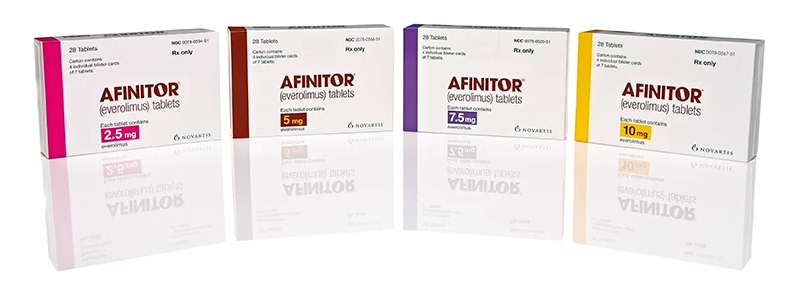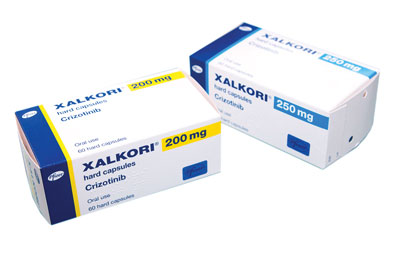Afinitor (everolimus) vs Xalkori (crizotinib)
Afinitor (everolimus) vs Xalkori (crizotinib)
Afinitor (everolimus) is an mTOR inhibitor primarily used to treat certain types of cancers such as advanced renal cell carcinoma, subependymal giant cell astrocytoma (SEGA), and neuroendocrine tumors, among others. Xalkori (crizotinib) is an ALK and ROS1 inhibitor indicated for the treatment of non-small cell lung cancer (NSCLC) that is ALK or ROS1-positive. The choice between Afinitor and Xalkori would depend on the specific type and molecular profile of the cancer being treated, as they target different pathways and are used for distinct cancer types with respective genetic mutations.
Difference between Afinitor and Xalkori
| Metric | Afinitor (everolimus) | Xalkori (crizotinib) |
|---|---|---|
| Generic name | Everolimus | Crizotinib |
| Indications | Advanced hormone receptor-positive, HER2-negative breast cancer, advanced neuroendocrine tumors, renal cell carcinoma, tuberous sclerosis complex | Non-small cell lung cancer (NSCLC), ROS1-positive NSCLC, ALK-positive metastatic NSCLC |
| Mechanism of action | mTOR inhibitor, which inhibits cell proliferation and angiogenesis | ALK and ROS1 tyrosine kinase inhibitor, which blocks signals that promote tumor cell growth |
| Brand names | Afinitor, Zortress | Xalkori |
| Administrative route | Oral | Oral |
| Side effects | Mouth ulcers, infections, rash, fatigue, diarrhea, decreased appetite | Visual problems, nausea, diarrhea, vomiting, edema, constipation |
| Contraindications | Hypersensitivity to everolimus or other rapamycin derivatives | Hypersensitivity to crizotinib |
| Drug class | mTOR inhibitor | ALK and ROS1 inhibitor |
| Manufacturer | Novartis | Pfizer |
Efficacy
Efficacy of Afinitor (Everolimus) in Lung Cancer
Afinitor (Everolimus) is primarily known for its use in various types of cancer, including advanced renal cell carcinoma and certain types of breast cancer. However, its efficacy in lung cancer, specifically non-small cell lung cancer (NSCLC), has been explored in clinical studies. Everolimus works by inhibiting the mammalian target of rapamycin (mTOR), a protein that plays a crucial role in cell proliferation and angiogenesis. In the context of NSCLC, everolimus has been evaluated in several clinical trials, often in combination with other therapeutic agents. While some studies have shown a benefit in terms of disease stabilization and progression-free survival, everolimus is not a standard treatment for lung cancer and is typically considered in selected cases, such as when the disease is refractory to other treatments.
Efficacy of Xalkori (Crizotinib) in Lung Cancer
Xalkori (Crizotinib) is an oral medication approved for the treatment of certain types of NSCLC that express an abnormal anaplastic lymphoma kinase (ALK) gene. Crizotinib is a tyrosine kinase inhibitor that targets ALK and ROS1 receptors, which can drive tumor growth in some lung cancers. The efficacy of crizotinib has been demonstrated through multiple clinical trials, which have shown significant improvement in progression-free survival compared to chemotherapy in patients with ALK-positive NSCLC. Additionally, crizotinib has been associated with high response rates, with many patients experiencing tumor shrinkage. The drug has become a standard treatment option for patients with ALK-positive NSCLC, reflecting its targeted mechanism of action and its role in personalized cancer therapy.
Comparative Efficacy in Lung Cancer
When comparing the efficacy of Afinitor and Xalkori in the treatment of lung cancer, it is important to note that they target different pathways and are used in different patient populations. Afinitor is not commonly used as a first-line treatment for lung cancer and may be considered in a more experimental context or for off-label use. On the other hand, Xalkori is a well-established treatment for ALK-positive NSCLC, with robust data supporting its use in this subset of patients. The choice of treatment is highly dependent on the molecular characteristics of the tumor, and therefore, molecular testing is essential to determine the most appropriate therapy for individual patients with lung cancer.
Conclusion
In conclusion, both Afinitor and Xalkori have shown efficacy in the treatment of lung cancer, albeit in different contexts and patient populations. Afinitor's role in lung cancer remains limited and is not a standard of care, while Xalkori has a defined place in the treatment of patients with ALK-positive NSCLC. The efficacy of these drugs highlights the importance of understanding the molecular underpinnings of cancer to optimize treatment strategies and improve patient outcomes. As research continues, the therapeutic landscape for lung cancer is likely to evolve, potentially expanding the indications for existing drugs and introducing new targeted therapies.
Regulatory Agency Approvals
Afinitor
-
European Medical Agency (EMA), European Union

-
Food and Drug Administration (FDA), USA

-
Health Canada

-
Pharmaceuticals and Medical Devices Agency (PMDA), Japan

-
Therapeutic Goods Administration (TGA), Australia

Xalkori
-
European Medical Agency (EMA), European Union

-
Food and Drug Administration (FDA), USA

-
Health Canada

-
Pharmaceuticals and Medical Devices Agency (PMDA), Japan

-
Therapeutic Goods Administration (TGA), Australia

Access Afinitor or Xalkori today
If Afinitor or Xalkori are not approved or available in your country (e.g. due to supply issues), you can access them via Everyone.org.
How it works

Make an enquiry
Choose the medicine you want to buy, answer a couple of questions, and upload your prescription to speed things up. We’ll get back to you within 24 hours.


Make an enquiry
Choose the medicine you want to buy, answer a couple of questions, and upload your prescription to speed things up. We’ll get back to you within 24 hours.


Breeze through the paperwork
We'll guide you through the required documents for importing unapproved medicine, ensuring you have all the necessary information.


Get a personalized quote
We’ll prepare a quote for you, including medicine costs and any shipping, administrative, or import fees that may apply.


Receive your medicine
Accept the quote and we’ll handle the rest - sourcing and safely delivering your medicine.

Some text on this page has been automatically generated. Speak to your physician before you start a new treatment or medication.
Let's talk
If you have any questions, call us or send us a message through WhatsApp or email:
Contact us




